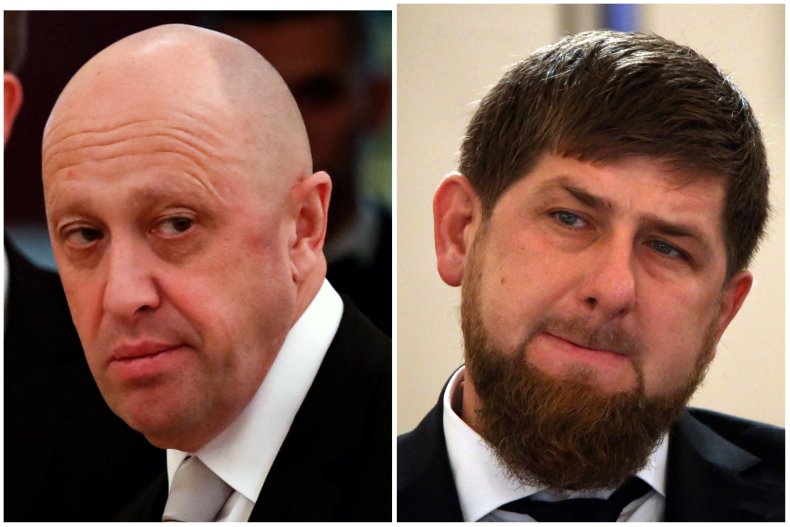Wagner Group Chief's Campaign To Restore 'Waning Influence' Takes Hit: ISW
Wagner Group chief Yevgeny Prigozhin's attempts to restore his "waning influence" in the Russian political sphere have taken a significant hit, according to analysts of the ongoing conflict in Ukraine.
The Institute for the Study of War, a think tank based in Washington D.C., said in an assessment on Saturday that Prigozhin had attempted to get Chechen leader Ramzan Kadyrov on his side to join an effort to undermine the Russian Ministry of Defense.
It added: "Kadyrov's endorsement of the Russian MoD follows Prigozhin's attempt to court Kadyrov's support through a publicized visit to a wounded Akhmat Special Forces commander on February 16.
"Prigozhin appears to be intensifying his informational campaign against the MoD, stating on February 18 that the Wagner Group is not subordinate to the MoD and 'has nothing to do with the Russian Army.'

The Wagner Group escalated its feud with the Russian government after it shared a video of troops it said were killed in Ukraine due to a lack of support from the country's military establishment.
Prigozhin and Kadyrov's differing attitude towards the Russian MoD is significant as the Wagner Group chief used the Chechen leader's criticism of Russian military officials in October 2022 to undermine the department in a bid to establish the mercenary organization as Russia's elite force in Ukraine.
The ISW said Kadyrov "likely refused" Prigozhin's campaign against the MoD as he has formal ties to the Kremlin and his rule in Chechnya is supported by Russian President Vladimir Putin.
The think tank added: "Prigozhin is likely trying to enlist ultranationalist figures within the Kremlin and select Russian milbloggers (military bloggers) to support his quest for authority in Russia but will likely find that those with ties to the Kremlin may turn away from him to retain their patronage."
Prigozhin's Military Boasts
Prigozhin has attempted to expand his influence within the sphere of Russian politics in recent months, despite the country's war with Ukraine developing into a protracted war.
In January, the Wagner Group chief credited himself and the outfit with the capture of Soledar, a small salt-mining town in occupied Ukraine's eastern Donetsk region. It was the first Russian battlefield gain in the country since the summer of 2022.
Prigozhin recently promoted supposed gains made by Wagner fighters, namely the capture of Paraskoviivka, just north of Bakhmut, also in the Donetsk region.
On February 17, Progozhin posted a photo of Wagner fighters in the village. The ISW said it was later geolocated, indicating the group was in the northern area of the settlement.
Wagner Group Casualties
But the mercenary group's gains have come at a steep cost, with the White House commenting that thousands of its members had been killed.
John Kirby, the National Security Council coordinator for strategic communications, said on Friday that the Wagner Group had suffered more than 30,000 casualties, including 4,500 deaths.
In January, the U.K.'s Ministry of Defense indicated the Wagner Group had up to 50,000 fighters in Ukraine and dubbed it a "key component" in Russia's campaign.
Latest Defence Intelligence update on the situation in Ukraine - 20 January 2023
— Ministry of Defence 🇬🇧 (@DefenceHQ) January 20, 2023
Find out more about the UK government's response: https://t.co/5z9U167MxU
🇺🇦 #StandWithUkraine 🇺🇦 pic.twitter.com/johkRTuMp8
The Wager Group has relied heavily on convicts during the fighting in occupied eastern Ukraine. According to the White House, 90 percent of those killed in December alone were convicts.
Recent reports suggested the mercenary outfit had recently employed predatory practices to recruit convicts, including threatening prisoners with additional criminal cases and solitary confinement if they refused to join.
Newsweek has contacted Joana de Deus Pereira, a senior research fellow at the Royal United Services Institute, a British think tank, and the Kremlin for comment.

